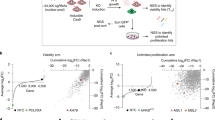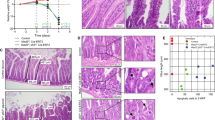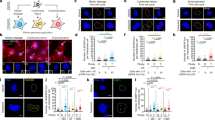Abstract
Mcm4 (minichromosome maintenance–deficient 4 homolog) encodes a subunit of the MCM2-7 complex (also known as MCM2–MCM7), the replication licensing factor and presumptive replicative helicase. Here, we report that the mouse chromosome instability mutation Chaos3 (chromosome aberrations occurring spontaneously 3), isolated in a forward genetic screen, is a viable allele of Mcm4. Mcm4Chaos3 encodes a change in an evolutionarily invariant amino acid (F345I), producing an apparently destabilized MCM4. Saccharomyces cerevisiae strains that we engineered to contain a corresponding allele (resulting in an F391I change) showed a classical minichromosome loss phenotype. Whereas homozygosity for a disrupted Mcm4 allele (Mcm4−) caused preimplantation lethality, McmChaos3/− embryos died late in gestation, indicating that Mcm4Chaos3 is hypomorphic. Mutant embryonic fibroblasts were highly susceptible to chromosome breaks induced by the DNA replication inhibitor aphidicolin. Most notably, >80% of Mcm4Chaos3/Chaos3 females succumbed to mammary adenocarcinomas with a mean latency of 12 months. These findings suggest that hypomorphic alleles of the genes encoding the subunits of the MCM2-7 complex may increase breast cancer risk.
This is a preview of subscription content, access via your institution
Access options
Subscribe to this journal
Receive 12 print issues and online access
$209.00 per year
only $17.42 per issue
Buy this article
- Purchase on Springer Link
- Instant access to full article PDF
Prices may be subject to local taxes which are calculated during checkout




Similar content being viewed by others
References
Shima, N. et al. Phenotype-based identification of mouse chromosome instability mutants. Genetics 163, 1031–1040 (2003).
Fletcher, R.J. et al. The structure and function of MCM from archaeal M. thermoautotrophicum. Nat. Struct. Biol. 10, 160–167 (2003).
Keays, D.A., Clark, T.G. & Flint, J. Estimating the number of coding mutations in genotypic- and phenotypic-driven N-ethyl-N-nitrosourea (ENU) screens. Mamm. Genome 17, 230–238 (2006).
Maine, G.T., Sinha, P. & Tye, B.K. Mutants of S. cerevisiae defective in the maintenance of minichromosomes. Genetics 106, 365–385 (1984).
Tye, B.K. Minichromosome maintenance as a genetic assay for defects in DNA replication. Methods 18, 329–334 (1999).
Tye, B.K. MCM proteins in DNA replication. Annu. Rev. Biochem. 68, 649–686 (1999).
Forsburg, S.L. Eukaryotic MCM proteins: beyond replication initiation. Microbiol. Mol. Biol. Rev. 68, 109–131 (2004).
Lei, M. The MCM complex: its role in DNA replication and implications for cancer therapy. Curr. Cancer Drug Targets 5, 365–380 (2005).
Moyer, S.E., Lewis, P.W. & Botchan, M.R. Isolation of the Cdc45/Mcm2–7/GINS (CMG) complex, a candidate for the eukaryotic DNA replication fork helicase. Proc. Natl. Acad. Sci. USA 103, 10236–10241 (2006).
Labib, K., Tercero, J.A. & Diffley, J.F. Uninterrupted MCM2–7 function required for DNA replication fork progression. Science 288, 1643–1647 (2000).
Rothstein, R. Targeting, disruption, replacement, and allele rescue: integrative DNA transformation in yeast. Methods Enzymol. 194, 281–301 (1991).
Glover, T.W., Arlt, M.F., Casper, A.M. & Durkin, S.G. Mechanisms of common fragile site instability. Hum. Mol. Genet. 14, R197–R205 (2005).
Lei, M., Kawasaki, Y. & Tye, B.K. Physical interactions among Mcm proteins and effects of Mcm dosage on DNA replication in Saccharomyces cerevisiae. Mol. Cell. Biol. 16, 5081–5090 (1996).
Liang, D.T., Hodson, J.A. & Forsburg, S.L. Reduced dosage of a single fission yeast MCM protein causes genetic instability and S phase delay. J. Cell Sci. 112, 559–567 (1999).
Woodward, A.M. et al. Excess Mcm2–7 license dormant origins of replication that can be used under conditions of replicative stress. J. Cell Biol. 173, 673–683 (2006).
Gonzalez, M.A., Tachibana, K.E., Laskey, R.A. & Coleman, N. Control of DNA replication and its potential clinical exploitation. Nat. Rev. Cancer 5, 135–141 (2005).
Cortez, D., Glick, G. & Elledge, S.J. Minichromosome maintenance proteins are direct targets of the ATM and ATR checkpoint kinases. Proc. Natl. Acad. Sci. USA 101, 10078–10083 (2004).
Snyder, M., He, W. & Zhang, J.J. The DNA replication factor MCM5 is essential for Stat1-mediated transcriptional activation. Proc. Natl. Acad. Sci. USA 102, 14539–14544 (2005).
Stoeber, K. et al. DNA replication licensing and human cell proliferation. J. Cell Sci. 114, 2027–2041 (2001).
Shetty, A. et al. DNA replication licensing and cell cycle kinetics of normal and neoplastic breast. Br. J. Cancer 93, 1295–1300 (2005).
Bartkova, J. et al. DNA damage response as a candidate anti-cancer barrier in early human tumorigenesis. Nature 434, 864–870 (2005).
Gorgoulis, V.G. et al. Activation of the DNA damage checkpoint and genomic instability in human precancerous lesions. Nature 434, 907–913 (2005).
Malumbres, M. & Barbacid, M. To cycle or not to cycle: a critical decision in cancer. Nat. Rev. Cancer 1, 222–231 (2001).
Sidorova, J.M. & Breeden, L.L. Precocious G1/S transitions and genomic instability: the origin connection. Mutat. Res. 532, 5–19 (2003).
Ekholm-Reed, S. et al. Deregulation of cyclin E in human cells interferes with prereplication complex assembly. J. Cell Biol. 165, 789–800 (2004).
Lengronne, A. & Schwob, E. The yeast CDK inhibitor Sic1 prevents genomic instability by promoting replication origin licensing in late G(1). Mol. Cell 9, 1067–1078 (2002).
Reinholdt, L., Ashley, T., Schimenti, J. & Shima, N. Forward genetic screens for meiotic and mitotic recombination-defective mutants in mice. Methods Mol. Biol. 262, 87–107 (2004).
Dertinger, S.D., Torous, D.K. & Tometsko, K.R. Simple and reliable enumeration of micronucleated reticulocytes with a single-laser flow cytometer. Mutat. Res. 371, 283–292 (1996).
Darzynkiewicz, Z. & Juan, G. Analysis of DNA Content of BrdU Incorporation (John Wiley & Sons, New York, 1997).
Cardiff, R.D. et al. The mammary pathology of genetically engineered mice: the consensus report and recommendations from the Annapolis meeting. Oncogene 19, 968–988 (2000).
Acknowledgements
We thank B.S. Collins for assistance with mouse necropsy, K. Schimenti for help with flow cytometric analysis and I. Mikaelian for initial pathological analysis. This work was supported by grant R01 GM45415 from the US National Institutes of Health to J.C.S. N.S. was a recipient of Department of Defense Breast Cancer Research fellowship DAMD 17-01-1-0277.
Author information
Authors and Affiliations
Contributions
The technical design, gene identification and model characterization were conducted primarily by N.S.; A.A. performed pathology analysis; I.L. conducted the yeast analyses using a construct made by S.A.H., and both were overseen by B.K.T.; T.R.B. and C.A. conducted protein and cell cycle analyses; R.M. performed embryonic stem cell culture and microinjections and J.S. oversaw the mutant screening project and was mentor to The Jackson Laboratory/Cornell team. The paper was co-written by N.S. and J.C.S.
Corresponding authors
Ethics declarations
Competing interests
The authors declare no competing financial interests.
Supplementary information
Supplementary Fig. 1
Structure of the Mcm4 gene-trap allele. (PDF 94 kb)
Supplementary Fig. 2
Extended survival of Mcm4Chaos3/Mcm4− embryos in mixed backgrounds. (PDF 547 kb)
Supplementary Table 1
Genes in the Chaos3 critical region. (PDF 83 kb)
Supplementary Table 2
Spontaneous tumors in Mcm4Chaos3 homozygous mice. (PDF 53 kb)
Supplementary Table 3
Primers used for positional cloning and genotyping. (PDF 35 kb)
Rights and permissions
About this article
Cite this article
Shima, N., Alcaraz, A., Liachko, I. et al. A viable allele of Mcm4 causes chromosome instability and mammary adenocarcinomas in mice. Nat Genet 39, 93–98 (2007). https://doi.org/10.1038/ng1936
Received:
Accepted:
Published:
Issue Date:
DOI: https://doi.org/10.1038/ng1936
This article is cited by
-
Unwinding Helicase MCM Functionality for Diagnosis and Therapeutics of Replication Abnormalities Associated with Cancer: A Review
Molecular Diagnosis & Therapy (2024)
-
Unwinding the Role of the CMG Helicase in Inborn Errors of Immunity
Journal of Clinical Immunology (2023)
-
Chromatin-based DNA replication initiation regulation in eukaryotes
Genome Instability & Disease (2023)
-
ITRAQ-based quantitative proteomic analysis reveals that VPS35 promotes the expression of MCM2-7 genes in HeLa cells
Scientific Reports (2022)
-
Transcriptome analyses of 7-day-old zebrafish larvae possessing a familial Alzheimer’s disease-like mutation in psen1 indicate effects on oxidative phosphorylation, ECM and MCM functions, and iron homeostasis
BMC Genomics (2021)



